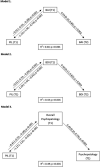Evolution of psychopathology, purpose in life, and moral courage in healthcare workers during the COVID-19 pandemic: a longitudinal study
- PMID: 38045963
- PMCID: PMC10690591
- DOI: 10.3389/fpubh.2023.1259001
Evolution of psychopathology, purpose in life, and moral courage in healthcare workers during the COVID-19 pandemic: a longitudinal study
Abstract
Introduction: Almost 2 years and five infection waves after the COVID-19 pandemic started, healthcare workers continued dealing with the pandemic situation and facing the health consequences and the mental health disorders it caused. This study aimed to evaluate the onset and progression of psychopathology as well as the role of predictor variables such as purpose in life and moral courage among healthcare workers during this time.
Materials and methods: This was a longitudinal prospective study carried out with 45 Spanish healthcare workers who answered two questionnaires, the first questionnaire in April-May 2020 (T1) and the second questionnaire in September-October 2021 (T2).
Results: Although 29.5% of the sample considered that their mental health had improved over this time, almost half of them (47.7%) said it had not changed, while 22.7% reported a decline in their mental health from the first time they were asked. Specifically, 46.8% presented anxiety, 23.4% depression, and 42.6% acute stress at T1, and 38.3% had anxiety, 17% depression, and 27.7% post-traumatic stress disorder at T2. Despite this, there were no differences between T1 and T2 anxiety scores (p = 0.53), although there was a decrease in depression (p = 0.03) and acute stress (p = 0.02) scores. Predictor variable outcomes such as purpose in life (p = 0.88) and moral courage (p = 0.86; p = 0.38) did not change over time, but when modelling the data, purpose in life predicted psychopathology at T1, which in turn affected the psychopathology results at T2.
Conclusion: This study showed that, although psychopathology decreased over the months, its prevalence remained high. Even though the purpose in life predicted psychopathology at T1, it seems that once the psychopathology is established (T2), the factors that would improve it would be different from the protective factors that prevented its establishment, which become secondary.
Keywords: COVID-19; anxiety; burnout; depression; longitudinal; moral courage; post-traumatic stress disorder; purpose in life.
Copyright © 2023 Echeverria, Roselló-Jiménez, Benito, Rojas-Bernal, O’Higgins and Haro.
Conflict of interest statement
The authors declare that the research was conducted in the absence of any commercial or financial relationships that could be construed as a potential conflict of interest.
Figures
Similar articles
-
Comparison of psychopathology, purpose in life and moral courage between nursing home and hospital healthcare workers during the COVID-19 pandemic.Sci Rep. 2024 Aug 7;14(1):18305. doi: 10.1038/s41598-024-68983-7. Sci Rep. 2024. PMID: 39112550 Free PMC article.
-
"Healthcare Kamikazes" during the COVID-19 Pandemic: Purpose in Life and Moral Courage as Mediators of Psychopathology.Int J Environ Res Public Health. 2021 Jul 6;18(14):7235. doi: 10.3390/ijerph18147235. Int J Environ Res Public Health. 2021. PMID: 34299681 Free PMC article.
-
Burnout, psychopathology and purpose in life in healthcare workers during COVID-19 pandemic.Front Public Health. 2022 Aug 5;10:926328. doi: 10.3389/fpubh.2022.926328. eCollection 2022. Front Public Health. 2022. PMID: 36052010 Free PMC article.
-
Prevalence of depression, anxiety and post-traumatic stress disorder in health care workers during the COVID-19 pandemic: A systematic review and meta-analysis.PLoS One. 2021 Mar 10;16(3):e0246454. doi: 10.1371/journal.pone.0246454. eCollection 2021. PLoS One. 2021. PMID: 33690641 Free PMC article.
-
What We Have Learned from Two Decades of Epidemics and Pandemics: A Systematic Review and Meta-Analysis of the Psychological Burden of Frontline Healthcare Workers.Psychother Psychosom. 2021;90(3):178-190. doi: 10.1159/000513733. Epub 2021 Feb 1. Psychother Psychosom. 2021. PMID: 33524983 Free PMC article.
Cited by
-
Comparison of psychopathology, purpose in life and moral courage between nursing home and hospital healthcare workers during the COVID-19 pandemic.Sci Rep. 2024 Aug 7;14(1):18305. doi: 10.1038/s41598-024-68983-7. Sci Rep. 2024. PMID: 39112550 Free PMC article.
-
Editorial: COVID-19: psychopathology of a pandemic.Front Psychiatry. 2024 Jul 19;15:1448701. doi: 10.3389/fpsyt.2024.1448701. eCollection 2024. Front Psychiatry. 2024. PMID: 39100854 Free PMC article. No abstract available.
References
-
- ECDC . (2020). Rapid risk assessment: coronavirus disease 2019 (COVID-19) pandemic: increased transmission in the EU/EEA and the UK—Eighth update. Available at: https://www.ecdc.europa.eu/en/publications-data/rapid-risk-assessment-co...
Publication types
MeSH terms
LinkOut - more resources
Full Text Sources
Medical
Miscellaneous


